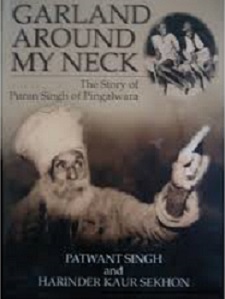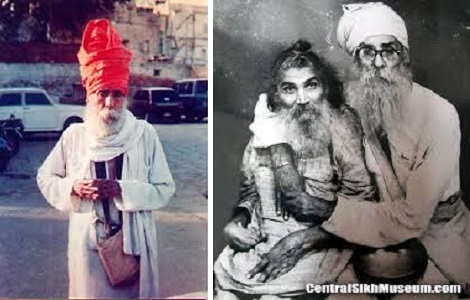Oct 14, 2025
Oct 14, 2025
Garland Around My Neck by Patwant Singh and Harinder Kaur Sekhon
 This book really made for a nostalgic reading and I wanted to really thank the authors for sharing such a vital and captivating history. This is a story of simple Bhagat Puran Singh who made service of those less fortunate “who can’t help themselves” the mission of his life. Even the title of the book under review is, in the words from Bhagat Puran Singh Ji’s own writings on Page 156 of this book; “Piara, whom I consider to be a blessing from God…. Piara was like a garland around my neck.” Now, we now where the title for this book comes from. Bhagat Puran Singh came from Lahore to Amritsar during the partition days carrying Piara on his back. Piara with his arms locked around the neck of Bhagat Puran Singh, was his constant companion for fourteen years. This one act of caring for a crippled, mentally challenged body covered with feces sums up the spirit of service in Bhagat Ji.
This book really made for a nostalgic reading and I wanted to really thank the authors for sharing such a vital and captivating history. This is a story of simple Bhagat Puran Singh who made service of those less fortunate “who can’t help themselves” the mission of his life. Even the title of the book under review is, in the words from Bhagat Puran Singh Ji’s own writings on Page 156 of this book; “Piara, whom I consider to be a blessing from God…. Piara was like a garland around my neck.” Now, we now where the title for this book comes from. Bhagat Puran Singh came from Lahore to Amritsar during the partition days carrying Piara on his back. Piara with his arms locked around the neck of Bhagat Puran Singh, was his constant companion for fourteen years. This one act of caring for a crippled, mentally challenged body covered with feces sums up the spirit of service in Bhagat Ji.
Every Punjabi family has heard his name, have seen the donation boxes of his institution Pingalwara, and have read their free publications. The reason I am appreciative of the book publication is that we do not accord proper recognition to authentic and genuine, selfless, dedicated individuals. I will substantiate this statement with a quote from the book on Page 136 “Chunder (Union Minister of Social Welfare Department, India) was no less baffled than his officials when in 1979 Puran Singh was instead awarded the Padma Shri: the lowest in the rung of civilian awards, and not the second highest (Padma Vibhusan) they had recommended!” This is a true portrait of how we show our admiration in honoring such true and rare humans for their honest service to the least privileged. Now, contrast this with the accolades showered on Mother Teresa of Kolkata, who was awarded the highest award of Bharat Ratna by India after she was honored with the Nobel Prize.

In the Introduction to the book the authors have explored the history of spirituality and religion generally in India and more specifically in Punjab. There are five Chapters in the book. In the First Chapter: The Early Years of the life of Bhagat Puran Singh are described starting with his birth on 4 June 1904 to father Chibu Mal and mother Mehtab Kaur. His mother made deep impression on him and her words and actions stayed with him all his life. The seeds of service were planted in him at Gurudwara Dera Sahib in Lahore through his meetings with Sardar Harnam Singh.
Chapter Two: The Turning Point captures the decisive events relating to care of a four year old child Piara, a mentally impaired and physically deformed who was entrusted to Bhagat Puran Singh by Giani Achhar Singh of Dera Sahib. When he crossed the border at the time of partition of the country in August 1947 he had little over a Rupee in his pocket and then seventeen years old Piara on his back. The camp set up in Amritsar for the refugees was wound up on 31 December 1947, with complete uncertainty for the handicapped and mentally impaired. Bhagat Puran Singh decided to take responsibility of the twenty he was caring for in the camp. With no shelter available he moved his inmates under a Pipal tree by the roadside, close to Amritsar railway station. He got busy collecting food and washing the clothes of inmates and taking care of all their other needs. He made up his mind to set up facilities for these less privileged and neglected members of the society in Amritsar. On 6th March 1957 All India Pingalwara Society was registered with the government.
Chapter Three: Pingalwara takes the reader through the journey of development of the grass root facilities without any financial resources or support. How many of us can do what he did? Let us check his own words on page 78 as to what he did: “I have swept the excreta of the patients I do not even know” or “I have carried mud and bricks on my head for the upcoming building of Pingalwara and am ready to do so even now when I am running into my 82nd year; I have begged for inmates from door to door and will do so even now.” The people responded and slowly with their support of small donations the institution took shape to help those “who can’t help themselves”. He was not establishing a hospital, but a shelter with clean bed and hope for those who were denied human dignity by uncaring society. Bhagat Ji summed his life in these words; “Mine has been a full and meaningful life-a guru-directed journey in the service of humanity”.
The next Chapter Four: The Transcendent Spirit goes into the details of other areas of concern for Bhagat Ji – ecology, deforestation, air, and water pollution. Planting of trees was to him an act of great kindness. How many individuals we can find who may be concerned about environment, but is planting tree is an act of kindness to them? He walked and refrained from the use of automobile to avoid air pollution. Even for transporting the handicapped, his preferred mode of transportation was bicycle. His three-A-formula for water conservation consists of austere use, alternatives to minimize waste; and afforestation to rebalance hydrological system. He breathed his last on 5th August 1992.
The last Chapter Five: Puran Singh in His Own Words is a bouquet of collection from his writings on Pingalwara; faith, his mother’s tremendous influence on him; service; and his first inmate and inspiration Piara; pollution and environment etc.
This beautifully illustrated biography is must read for everyone to inspire and serve the less fortunate humanity. This book should belong to the bookshelf of every house so that it is always available to go through it again and again. It will become the motivation to serve the less privileged beings. Even if the book fails to inspire, still the copy of this book on the shelf will be the homage to his indomitable spirit.
22-Jun-2019
More by : Bhupinder Singh